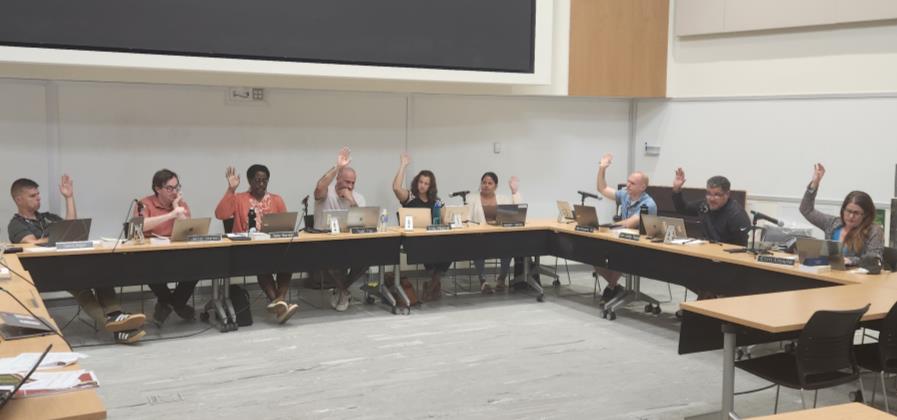
by Robert Lynch; August 22, 2025
Yes, it would be simpler if the principal or her assistant just grabbed phones away at the start of school, locked them up in her office, and didn’t give them back until dismissal. It would be easier, and also probably cheaper. But the Ithaca City School District (ICSD) doesn’t want to do it that way.
This coming Tuesday, August 26th, at a meeting that comes only about a week before the start of class, and with the imposition of a state-mandated, bell to bell ban on student cell phone use then to take effect, the Ithaca Board of Education is expected to adopt rules to implement Albany’s hastily-enacted prohibition. Most likely, the ICSD will issue high-tech, signal-canceling pouches to students. Pupils would put their phones within those Velcro-sealed pouches, stuff the pouches into their backpacks, and then keep them there throughout the school day. That’s the plan.
“Now, don’t take them out, Abigail and Aiden. Please. Scout’s honor?” Sure.
The 21st Century classroom environment has changed. Unless you learn there, work there, or visit there, you may not comprehend the transformation. Some say the change accelerated on the eve of the pandemic. A near-parasitic attachment has now glued the learner to his or her electronic device. Yes, it’s an addiction, an unhealthy one. And yes, the habit’s tough to break. The teenager of today has never known life differently.
“I used to joke and say that my grandbaby could watch YouTube videos before she could speak,” School Board President Dr. Sean Eversley Bradwell told the Board of Education August 12. ”And that was a fact, that wasn’t a joke.”
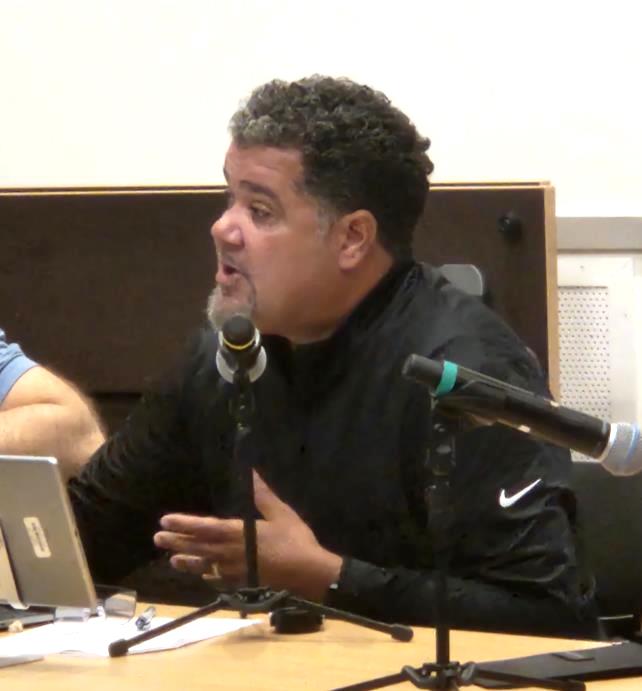
“We are still so embedded in using our phones in every part of the day,” Board colleague Erin Croyle later remarked. “I support not having cell phones in school,” Croyle affirmed. But then she added, “My kids hate me because I’m always telling them no screens and they’re not having phones.”
“All these things are dependent on a certain level of student trust, some level of culture shift,” Eversley Bradwell cautioned in matching the new rules to ingrained behavior. “It’s a generation that’s grown up with these devices. How we change that, that’s going to be the real question.”
For nearly an hour during their August 12 meeting, ICSD educators agonized over how best to implement Governor Kathy Hochul’s initiative to keep smart phones away from students as they learn. The ban was ratified by the State Legislature in May as part of New York’s yearly budget. Toward achieving compliance, ICSD Board members talked at length August 12, yet never achieved consensus.
The Ithaca Board of Education that night gave perfunctory, performative “first reading” acknowledgement—yet it stopped short of line-by-line approval—to a vaguely-worded compliance policy, one that would pretty much sanction any remedial measures the school district would choose to take:
“The ICSD Board of Education prohibits the use of personal internet-enabled devices by all students in preK-12 during the school day and on school grounds,” the draft policy states in part.
The draft document continues:
“The District shall provide at least one method for students to store internet-enabled devices on-site during the school day. Storage options include, but are not limited to the following: school-issued secure pouches/containers, secured lockers, and/or administrative office storage. Student backpacks are not considered adequate for storage purposes.”
That said, the internet-blocking, yet darned easy to open Velcro pouches will likely become the default method of smartphone confinement. Why? Because as was revealed at the meeting, administrators have already bought them. The pouches cost the district about $20 each, $20,000 in total, partially reimbursed by the state.
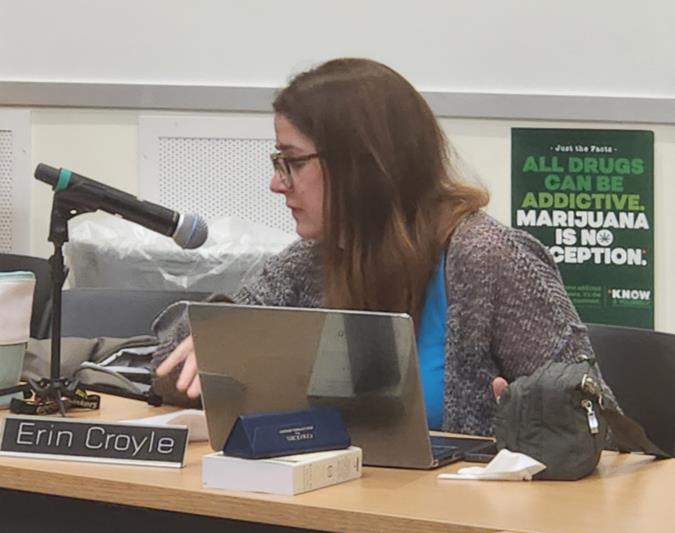
“I guess I’m a little bit surprised that the pouches were already purchased,” Board member Adam Krantweiss inquired at the early-August session. “I’m curious about the cost of that.” In short, shouldn’t the Board of Education have decided the issue first?
In Krantweiss’ opinion, quite simply, Administration put the cart before the horse, or more aptly stated, the purchase before the policy.
“We knew there was going to be a rush,” Kari Burke, ICSD’s Director of Athletics and Wellness and the District’s point-person on cell phone policy-writing, told Krantweiss. Not only is Ithaca buying the Hochul-compliant pouches, so, too, are many other districts, she said
“We didn’t want to be waiting in the queue,” Eversley Bradwell concurred, defending the arguably presumptive purchase.
“We knew we had to do something,” School Superintendent Dr. Luvelle Brown weighed in. “I don’t think there’s a perfect answer to it either,” Dr. Brown added. “But we are being compliant with what I see as a paternalistic and oppressive law.”
Ouch! Dr. Brown’s words revealed much. Not only students, but also many educators and parents dislike the cell phone ban that reelection-eyeing Hochul muscled through the Legislature last spring. Some “caregivers”—the newly-PC synonym for “parents”—believe cell phone access enables quicker, better student notification in the event of a school shooting, even though many in law enforcement disagree. Parents like to helicopter their kids. And there’s the heavy-hand-of-Albany argument too. Eversley Bradwell said some districts are considering lawsuits.
At a pre-election candidates’ forum May 15, Madeline Cardona, subsequently elevated to a one-year school board term, voiced concern about the cell phone ban. She warned it might compromise student safety. Cardona remained mostly silent during the board’s August 12 discussions.
Todd Fox, a conservative elected to the ICSD Board in the taxpayer-driven, back-to-basics boomlet of 2024, came to the early-August meeting as the cell phone ban’s most ardent defender. But Fox questioned the Velcro pouches’ effectiveness and the wisdom behind the district’s buying them. Each board member had been given a sample pouch. Fox waved his around as a prop.
“My concern is, they’re not going to use these,” Fox asserted during his show-and-tell. “They’re big. It’s bulky… If I was a student, I wouldn’t carry this.”
“We bought these because we had to comply with the law,” Fox conceded. “What I’m saying is we didn’t need to purchase these because I don’t think they’re going to work.”
And then, Todd Fox argued, there’s the issue of student compliance. Velcro pouches entail about the lowest level of achievement predictability permitted under Hochul’s law.
“How does this stop kids from using their phones?” Todd Fox asked. “What I’m curious about is what’s to stop them in the middle of class kind of just opening this up and pulling their phone out,” Fox said, holding the pouch.
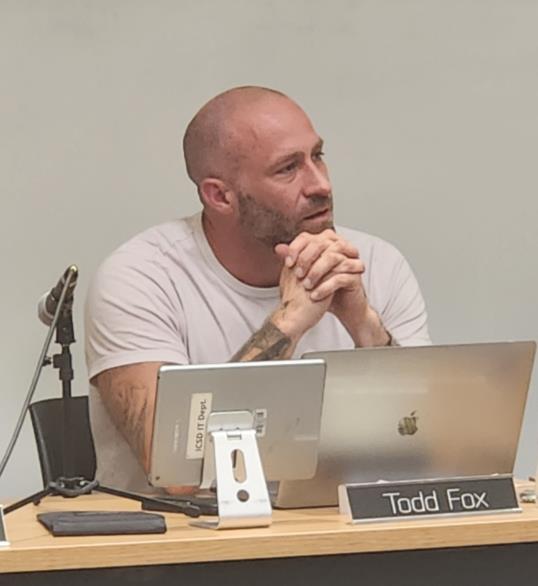
“Besides the obvious of their knowing that they may be violating a policy or norm in the classroom setting,” Kari Burke replied, attempting a plausible, though strikingly ingenuous answer. She then added, “The Velcro is a bit of a deterrent because it’s obviously pretty loud.”
“This seems like an adult solution to a kid’s problem.” Fox concluded of the pouch idea. “Kids are looking at this like, ‘You gotta’ be kidding me. I’ll put it in my backpack.”
What validates Todd Fox’s suspicion are the tepid enforcement procedures currently envisioned by the ICSD.
“No student will be suspended if the only reason for taking such action is the student’s violation of this policy,” the draft document explicitly prescribes.
The proposed policy also speaks of a “common set of tiered responses” for those who violate the rule. It also qualifies that:
“The Superintendent shall emphasize equitable, restorative practices when enforcing this policy and ensure that responses considered punitive in nature do not disproportionately affect protected groups or exacerbate inequity.”
A three-page document appended to the proposed policy details “Restorative Justice Supports and Suggestions” for enforcing the ban.
The referenced document advises that when a student takes out a phone: 1) Stay calm and use a supportive approach; 2) Offer a gentle reminder about the new regulation and invite a brief dialogue; and 3) Check in with the student and ask ”What do you need right now?”
And should a student have “broken an agreement or classroom norm,” the document advises instructors to pose questions like: 1) “What happened?”; 2) “What were you thinking or feeling at the time?”; 3) “Who was affected by your phone use?”; 4) “What part of our school expectations did you go against?”; and 5) “What do you need to do to make things right?”
Most with logic gained in the real world, far outside the educational bubble can find the problem here.
“I see this as a multi-minute conversation with any student who then brings out a cell phone during class,” board member Jacob Shiffrin observed. “And I don’t see how that’s feasible, so I’m struggling to understand.”
“There’s always a place for restorative conversations in that situation,” Superintendent Brown insisted.
Stressing what he termed “the addictive nature of cell phones,” Board President Eversley Bradwell said, “I never want to be in a situation where I’m being punitive for someone who relapses.” He added, “For me, it is restorative. It has to be from a place of love… When people are struggling for cultural change, the response is not to be punitive. The response is not to be regressive. The response is to be restorative.”
Largely based on the fine lines of enforcement, the Board of Education postponed its specific policy endorsements until its meeting on the 26th.
Aside from the Velcro pouches, other compliance options do exist. So-called “Yondr” [a brand name] magnetic-locking pouches came up in discussion. They’d cost more, yet provide greater assurance of proper enforcement. A Yondr locking device, presumably stationed at the door, would seal the phone-holding bags upon student arrival, and then release the magnet at day’s end. But Yondr technology is not perfect. Students can buy magnet releases online for as little as $6.
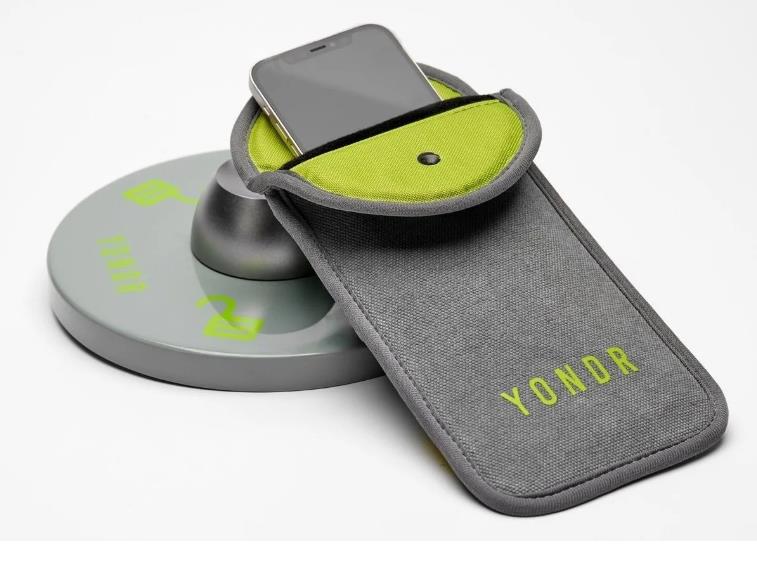
“Students are incredibly clever,” Burke advised her board. They can buy the unlocking device “and have a nice side business unlocking other students’ pouches.”
State rules also allow learners to keep their phones in their lockers all day, the Board was told. But welcome to the high school culture of 2025, one where the pupil doubles as a packhorse. “Kids walk around with all their stuff all day,” Erin Croyle reported.
Eversley Bradwell shared one novel idea a few districts have tried. It’s most bizarre; painting the entire school with radiofrequency-blocking paint. “Please don’t do that,” he said the State Education Department has advised.
And back to this story’s original idea—and it’s permitted within Ithaca’s draft policy—bell-to-bell phone confiscation. But as far as ICSD’s concerned, it’s a non-starter.
“We do not issue these devices to students,” Kari Burke reminded the board of the phones. “We do not want to take them off of their person. We do not want to be responsible for them.”
“That comes with all kinds of liability,” the board president said as to administrative sequestration. “We’ve heard feedback from parents: ‘No, I don’t want that; I don’t want you having my child’s phone while they’re in the school day,’” Eversley Bradwell said caregivers have told him. “I would feel uncomfortable holding—having the school be liable for people’s property for a significant amount of time,” the board president said.
The proposed ICSD cell phone policy would carve limited exceptions, allowances to students needing phones for insulin monitoring, for translation to English, or to those responsible for another family member’s care.
Exceptions aside, and all obstacles considered, Board member Karen Yearwood offered perhaps the best idea. It starts at home.
“We as adults should be responsible in guiding our children,” Yearwood maintained. “Why are the students bringing the phone to school unless they need it for any medical reasons?” Yearwood asked.
“It’s going to be messy,” Board President Eversley Bradwell predicted in finding the cell phone ban’s sweet spot. “That’s just a fact. It’s going to be messy.”
###

